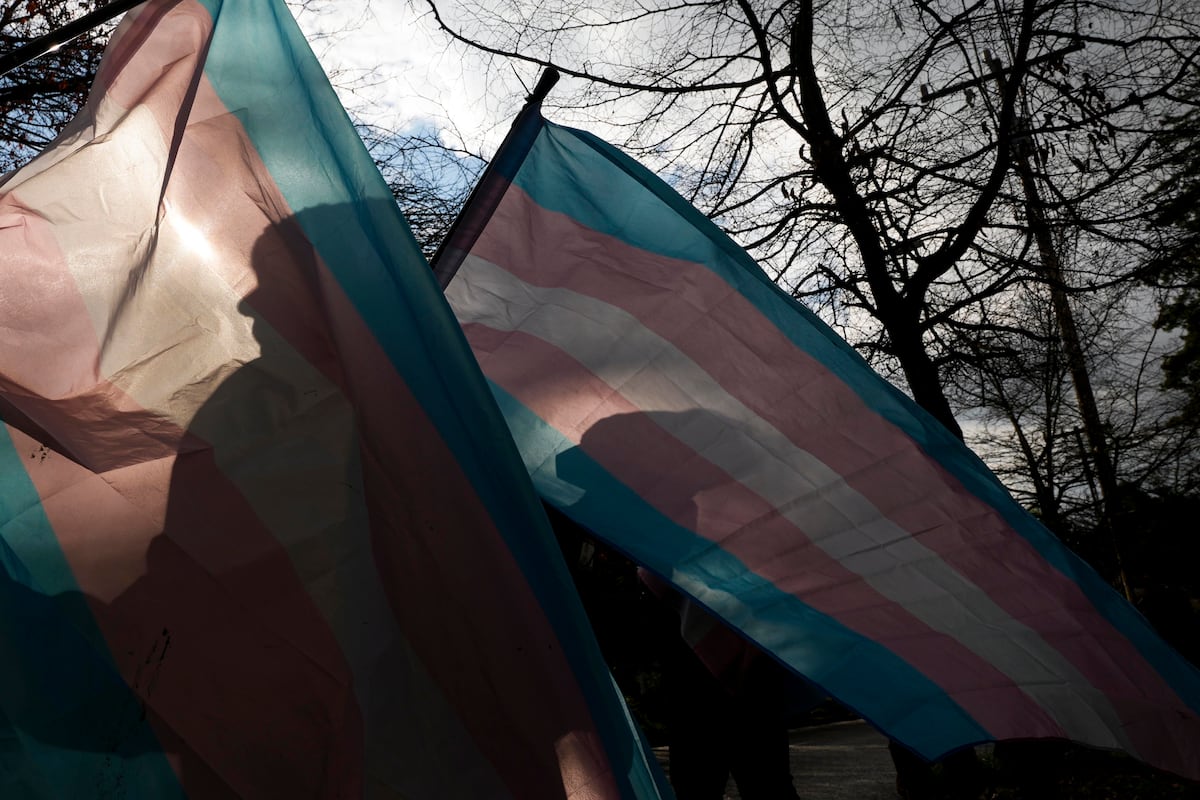Transgender service members with 15 to 18 years of service in the Air Force and Space Force are suing the Trump administration over what they say is a loss of early retirement benefits.
Seventeen transgender service members are requesting a reinstatement of their revoked pensions that they allege the Air Force promised, according to Monday’s filing in the Federal Court of Claims.
“I raised my hand and served my country honorably for 15 years, including a deployment to Afghanistan,” lead plaintiff Master Sgt. Logan Ireland said in a GLBTQ Legal Advocates and Defense press release. “Ripping away the retirements we have earned is a betrayal of the sacrifices made by service members and our families.”
Following a January executive order ousting transgender troops from the military, the Pentagon released guidance in February stating that service members who resigned voluntarily would be eligible for “voluntary separation pay.”
The latter for an E-5 service member with 10 years of service would equate to $101,628, while involuntary separation pay for the same service member would only yield $50,814, the guidance stated.
The Pentagon’s February memorandum also stated that service members with more than 18 but less than 20 years of service could apply for early retirement benefits.
Military personnel are typically only granted retirement once they reach 20 years of service.
Defense Secretary Pete Hegseth issued a memo on May 8 that instructed active duty transgender service members to apply for voluntary separation from the military by June 6, or else risk being involuntarily separated.
Then-Acting Assistant Secretary of the Air Force for Manpower and Reserve Affairs Gwen R. DeFilippi followed up shortly thereafter with a May 23 memo that provided further information on the voluntary separation process and outlined the possibility of early retirement for transgender service members with 15 to 18 years of service.
In June, the Air Force sent early retirement orders to transgender airmen plaintiffs in the case who had applied for early retirement as an exception to policy, per the GLAD Law statement.
Their dates for early retirement ranged from September to December of this year, according to the complaint.
But in an Aug. 4 memorandum, a copy of which could be seen on the unofficial Facebook page Air Force amn/nco/snco, the Air Force informed service members that their applications for early retirement were rejected.
“After careful consideration of the individual applications, I am disapproving all Temporary Early Retirement Authority (TERA) exception to policy requests in Tabs 1 and 2 for members with 15-18 years of service,” Brian Scarlett, who was performing duties of the Acting Assistant Secretary of the Air Force for Manpower and Reserve Affairs, said in the memo.
Service members were still eligible for voluntary separation, the memo stated.
An Air Force spokesperson told the Associated Press three days later that service members were solely “permitted to apply for an exception to policy” but that “none of the exceptions to policy were approved.”

Service members had been “prematurely notified,” the spokesperson said.
Shannon Minter — the legal director of the National Center for LGBTQ Rights, a group representing the plaintiffs along with GLAD Law — disagreed.
“That is simply false,” he told Military Times. “The orders went through the same official process they always go through. They were literally approved and signed and issued.”
Retirement orders can only be rescinded if “fraud, manifest error, mathematical error, mistake of law, or substantial new evidence renders the order invalid,” according to Air Force instruction DAFI36-3203.
Minter said none of these stipulations were met when the Air Force revoked early retirement for the plaintiffs.
Ireland said the Air Force’s justification didn’t make sense.
“How do I receive retirement orders signed by the secretary of the Air Force if they were prematurely given out?” he told Military Times over the phone.
The Air Force declined to comment on ongoing litigation or transgender service members’ loss of early retirement.
Ireland, who’s served for 15 years and had every intention of reaching 20, was gutted when the Trump administration’s executive order issuing the transgender military ban first rolled out.
But he said he felt that the Air Force was doing right by him and other transgender service members who’d served honorably for over a decade by offering them early retirement.
When the retirement orders were rescinded though, he said that changed.
“I felt that the Air Force was now seeing my service as meaningless when here I’ve devoted my life to this uniform and this service,” Ireland said. “Some of us have bled in this uniform, seen friends of ours die in this uniform. Was that all for nothing?”
Ireland said he had served his country for a higher purpose and for the retirement benefits that doing so would grant him.
Now, he would not only be missing out on the monthly pension, but also the TRICARE health coverage that would have extended to him and his whole family.
Going through voluntary or involuntary separation would only grant him access to U.S. Department of Veterans Affairs benefits and his family would have to find health care elsewhere, he said.
GLAD Law estimated that each family listed in the lawsuit against the Trump administration would stand to lose up to $1 million to $2 million over the course of their lifetimes due to loss of benefits, according to the release.
Since the Aug. 4 memo, Ireland told Military Times that he has heard nothing from the Air Force regarding the separation process, involuntary or voluntary.
Chain of command, inspector general — Ireland said he’d tried many channels, but to no avail.
“It’s been radio silence,” he added.
Minter outlined further concerns that the Air Force’s decision to renege on the possibility for early retirement posed.
“There should be a worry, you know, if the military gets away with doing this to transgender people, why can’t they do it to other service members in the future?” Minter said.
Minter was optimistic about the lawsuit’s chances in court but said it could take a long time before a judgment was reached, maybe even up to a year.
In the meantime, those transgender service members who had hoped to gain early retirement and all that came with it, would have to wait, with no pension and no TRICARE.
“If my service is no longer wanted — I know it’s needed — but if it’s no longer wanted, then do right by me and let me retain my benefits so I can exit the military with honor,” Ireland said.
Riley Ceder is a reporter at Military Times, where he covers breaking news, criminal justice, investigations, and cyber. He previously worked as an investigative practicum student at The Washington Post, where he contributed to the Abused by the Badge investigation.
Cristina Stassis is an editorial fellow for Defense News and Military Times, where she covers stories surrounding the defense industry, national security, military/veteran affairs and more. She is currently studying journalism and mass communication and international affairs at the George Washington University.
Read the full article here








